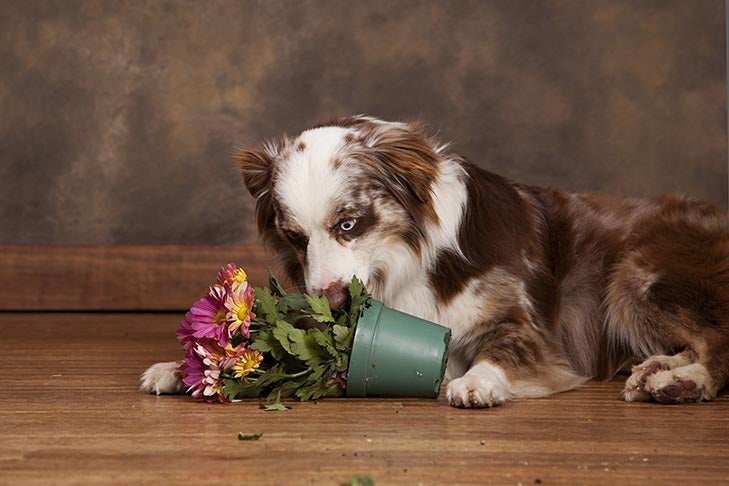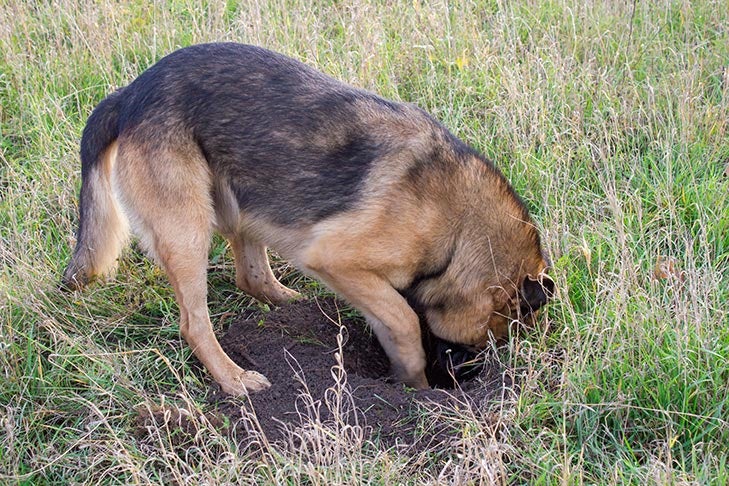Clubs Offering:
As a pet owner, you may have caught your dog eating (or attempting to eat) some pretty weird stuff. But have you ever observed your pet snacking on straight-up dirt?
Holistic veterinarian Dr. Laurie S. Coger, DVM, explains, “Dirt eating is a form of what is termed ‘pica,’ the ingestion of nonfood materials. There are many causes, including nutritional, behavioral, and physical. Stress or boredom can also lead to eating all sorts of things, including dirt.”
If your dog is continually eating dirt, you shouldn’t discount this behavior. It could be a sign of a bigger issue, such as:
Dr. Coger notes that while stomach and gastrointestinal issues could be to blame for your dog’s interest in dirt, canines are more likely to seek out grass in these cases. “If [the dirt eating] is frequent, intense/manic in nature, or large quantities are consumed, then it’s time to go to the vet,” she says. “Changes in stool would be another sign that a vet visit is in order. Bloodwork to look for underlying abnormalities may be helpful in pinpointing a cause.”

As you may expect, there are risks to letting your dog continually eat dirt. The main risk is impaction of the intestine (hardened stool that gets stuck in the body due to long-term constipation) if your dog eats a lot at once. Impaction often means surgery. “
The dirt could also contain pesticides, fertilizers, or other toxins that could reach toxic levels if enough dirt was ingested,” Dr. Coger adds. “Depending on the dirt, dental damage or wear could also be a concern.” If the dirt has rocks in it, for example, it could cause damage to your dog’s teeth and cause obstruction in the throat or any point along the digestive tract. Sharp sticks could puncture the linings of your dog’s mouth, throat, intestine, or stomach. It’s also possible that your dog could ingest a parasite along with the dirt, which can cause a range of additional health issues.
“I would add that any new, unnatural behavior, such as dirt eating, should be acted upon quickly,” Dr. Coger says, “both because of possible serious underlying causes and before it becomes a habit. Dogs will learn from other dogs in the house, and who wants a houseful of dirt eaters?”

If you’re worried that your dog’s dirt eating is due to a nutritional imbalance, you should consult your veterinarian about your canine companion’s diet and whether changes need to be made. On the behavior side, make sure your dog is getting enough physical and mental exercise to curb dirt eating that stems from boredom. If all else fails, “denying access to favorite dirt-eating areas may be required,” Dr. Coger says. Remember, dirt eating may be a sign of something bigger, so you should never ignore it.
Why Is My Dog Eating Dirt and Throwing Up?
Dogs’ bodies are built in such a way that whenever they ingest anything inedible, they will attempt to remove the unwanted material via vomiting.
“Sometimes eating dirt and other non-food items is a sign of gastrointestinal discomfort and dogs ingest this material in an attempt to find some relief,” explains Keefe.
She adds that ingestion of a small amount of dirt and a single episode of vomiting may not warrant veterinary care. However, pet parents need to get the dog examined by a veterinarian if the dog “repeatedly vomits or gags without bringing anything up, has diarrhea, seems in discomfort, or is lethargic.”
Puppies are naturally curious beings that love nothing more than to roll around in the grass and dig for goodies. “They are more likely to accidentally ingest dirt as they’re exploring the world,” says Keefe.
However, if you see the puppy eating dirt repeatedly, have him examined by a veterinarian to rule out any of the underlying issues listed above.
“It’s also important to discourage them from this behavior, so that it does not become a habit into adulthood,” recommends Keefe. Try redirecting your puppy away from the dirt with a toy, treat, or interactive game and use positive reinforcement when your puppy stays out of the dirt pile.
Don’t scold, yell, or punish your puppy for eating dirt as this can create conflict in your relationship and negative associations with the outdoors or your backyard down the road.
Eating dirt can pose a number of problems for your pooch. Taking in large quantities could cause life-threatening gastrointestinal impaction or blockage, which could require emergency surgery, according to Keefe.
In addition, dirt may contain dangerous materials that could harm your dog. Pesticides or fertilizers may be toxic, small rocks could cause damage to your dog’s teeth, and in severe cases cause choking or intestinal blockage. Sharp sticks could puncture their mouth, throat, or intestinal tract. There is also a risk of your pet ingesting intestinal parasite eggs or other infectious organisms in contaminated soil.
The Dangers of Dogs Eating Dirt
If you see your dog eating dirt, make sure to immediately discourage the behavior, as it can pose a number of risks to their health. Here are several risks associated with geophagia in dogs, according to the AKC: